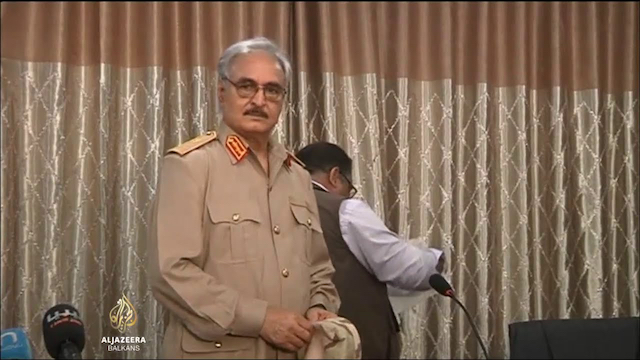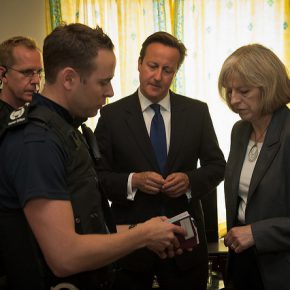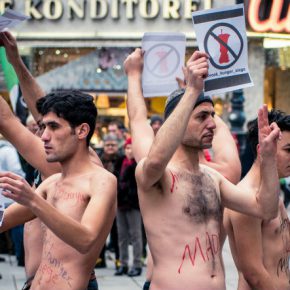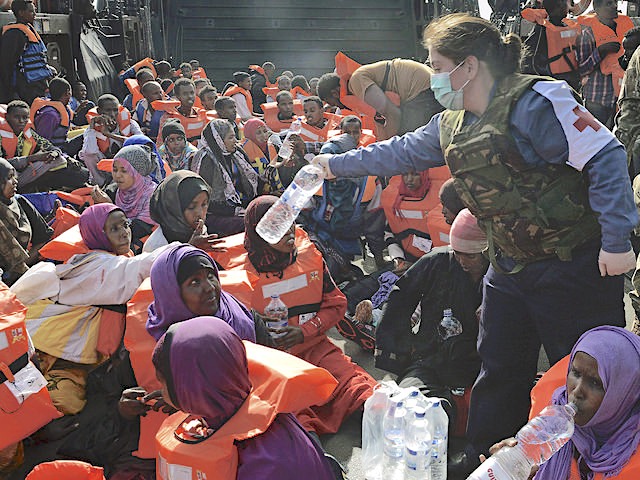The American intelligence community got two things out of the dusty Chadian hamlet of Ouadi Doum in Chad during the Reagan Administration. One was a Soviet-built Mi-25 Hind gunship left behind by the Libyan invaders, ferried out in 1987 for the military to take apart and study.
The other was a man: Libyan Colonel Khalifa Haftar and POW. The CIA recruited him in 1988 to the National Front for the Salvation of Libya … and the Agency has had many reasons to both rejoice and regret that decision ever since.
Their former ally has, after two decades’ of intriguing from his home in the suburbs of northern Virginia, come to control the lion’s share of Libya’s oil fields. This puts him at odds with the UN-backed Government of National Accord that formed last year, but the odds are in his favor, and not theirs.
Earlier in September, now-General Haftar struck across eastern Libya’s coast to drive out the “Petroleum Facilities Guard”. The surprise attacks took place as other militias continued to grind down the Islamic State’s last Libyan bastion in Sirte, though it is unclear if rival groups would or could have moved to save the Guard anyway. The region that Haftar’s men seized holds 80% of Libya’s proven oil reserves.
Though he received widespread international criticism for the attack the country’s National Oil Corporation – “the only institution authorised under UN resolutions to sell Libyan oil” – welcomed the move. It has now been able to resume exports under its own auspices since Haftar nominally turned control over the terminals and fields back to it.
Haftar’s move proved popular, or at least bearable, in some domestic circles because the “Petroleum Facilities Guard” treated the oil fields as a personal fiefdom once they drove the Islamic State away, and then used their control over them to extort concessions from all parties.
https://www.youtube.com/watch?v=lRles2b3gGU
Haftar has come far, further than even the CIA could have hoped when it first found him. It has been a long and convoluted journey.
He began his career decades ago, in the service of Muammar Gadhafi, fighting in Chad during the 1980s in support of a rival government (France and the US backed the other side). The conflict, though, ended in a loss for Libya. During the retreat, Haftar and several hundred of his men were captured. Not without justification, they felt they had been abandoned by Gadhafi, who disavowed them at the time of their capture and only after the war demanded their return.
The National Front for the Salvation of Libya, which Haftar joined rather than return to the tender mercies of Gadhafi’s regime, had been founded in 1981. In addition to its dissident political activities, the US envisioned a paramilitary function for it, in keeping with a long line of the CIA sponsoring émigré groups to overthrow foreign governments.
Like most of these groups, though, the Front failed to do so. Its 1996 guerilla campaign petered out quickly, without attaining anything like the notoriety of the Bay of Pigs fiasco. Libyan’s indigenous Islamist opposition that year captured the headlines, in fact, as it came close to assassinating Gadhafi in February, contributing to the paranoid climate later in the year in which the regime massacred 1,200 rioting prisoners.
Libya seemed destined to remain a pariah state for years to come, and Haftar was apparently done with direct action in his homeland. While Ahmed Chalabi would soon go on to win prominence in the Bush Administration for regime change, the colonel found few backers.
And then, to compound the defeat of 1996, in 2006, Libya was taken off Washington’s list of state sponsors of terrorism, the result of three years of secret meetings between Gadhafi’s regime and the Bush Administration that led to the reestablishment of formal ties. In stark contrast to its handling of Iraq, Bush found common ground with Reagan’s “mad dog,” who now sought to appease the international community and secure his throne by abandoning his foreign policy adventurism and chemical weapons stockpiles.
With Gadhafi ingratiating himself with Western spy agencies, defense contractors, energy companies, and financial institutions, it seemed like the Front would never get another chance at taking power, as the US had shown it could live with the regime’s still-dictatorial behavior at home so long as it behaved in the wider global order.
This changed in 2011, when NATO intervened in the Libyan Civil War and, with the support of local rebel militias and several Gulf nations sponsoring them, drove Gadhafi to ground and, ultimately, to his death at the hands of the National Transitional Council (NTC). That year, Haftar returned in triumph to Libya to lead the Council’s forces, replacing a more recent (and higher-ranked) defector to the anti-Gadhafi cause, Abdel Fatah Younes. Haftar was a compromise candidate: active enough in the past to have solid opposition credentials, yet distant enough from the immediate political scene that he seemed less threatening than Younes.
Obviously, the NTC greatly underestimated this man.
Younes was killed several months later by assailants alternatively said to be Islamists seeking revenge for the events of 1996, or rivals within the NTC. Haftar’s own star failed to rise despite the removal of a potential rival, and his anti-Islamist attitudes helped as much as they hurt him. He then shuttled back and forth between the US and Libya for three years. Then, in 2014, Haftar returned to the country to launch a putsch against the General National Congress (GNC) government in Benghazi and Tripoli. The preceding three years had been busy indeed, despite Haftar’s protests to the contrary when he returned to the US.
Able to secure the backing of a large number of soldiers, “Operation Dignity” fared far better than Haftar’s previous attempts to gain power, not least because of the Islamist GNC’s serious lack of popular support. He established his own power base and re-opened his lines of communications with foreign powers backing the country’s various regional governments seeking international recognition.
Haftar remains at odds with the Government of National Accord, yet appears to be a favorite of Egypt and the United Arab Emirates, whose goals in Libya are at odds with NATO. Yet NATO members are now also working with Haftar, and the UN will be compelled to as well, by its own admission, as will the Government of National Accord.
The CIA, though it might appreciate how Haftar stole a march on his enemies from a tactician’s viewpoint, has little to brag about “their man” given the state of Libya today. Still, the United States can will at least hold out hope he will prove tractable in the end, given the willingness of the multinational oil concerns to reopen the export market now that Haftar has done the heavy lifting for the National Oil Corporation.
Photograph courtesy of Al-Jazeera. All rights reserved.





